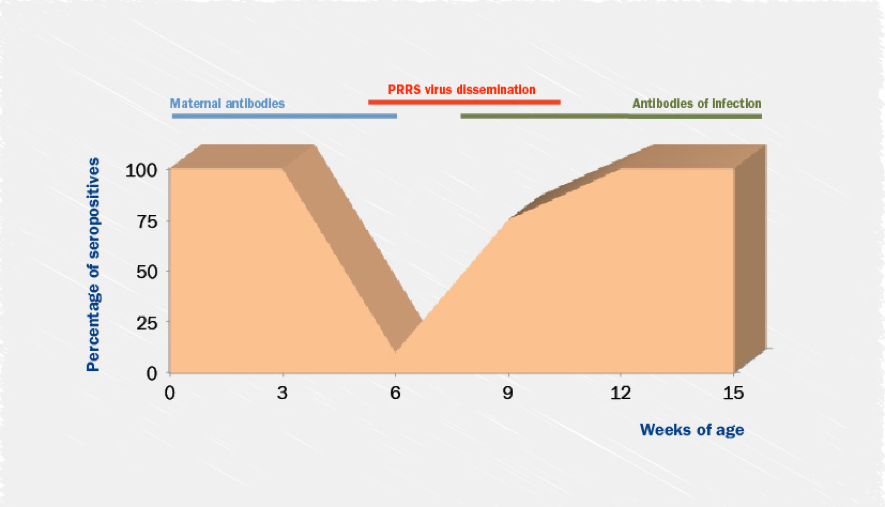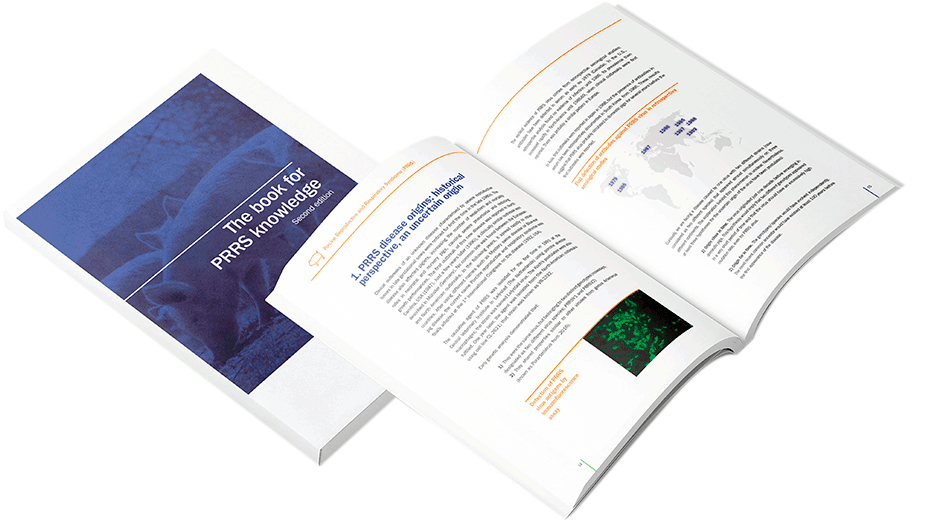On a farrow to finish farm where sows are vaccinated every 3 months against PRRS virus and the piglets are not vaccinated, the piglet’s ELISA results are these ones:
- 3-week-old piglets: PRRSV ELISA negative
- 8-week-old piglets: PRRSV ELISA positive.
What could be causing the fact that 3-week-old piglets do not have PRRS virus maternal immunity?
First of all we need to clarify how the passive immunity though PRRSV live vaccines works.
PRRSV live vaccines & Passive immunity: How does it work?
Attenuated vaccines are not producing a high level of serologically detected antibodies when they are administered to pigs that have not been in recent contact with PRRS live virus.
The strength of the serological reaction can vary depending on the wild strain present on the farm.
So… What could have happened?
The most probable reason being that wild PRRS virus does not circulate among sows and this is why the vaccine by itself it is not causing a strong serological reaction, but the piglets are protected as they become viremic after 6 weeks of age.
This is why serological antibodies are detected at 8 weeks of age.
Would you recommend piglet’s PRRS virus vaccination in this situation?
I would consider what is happening as normal.
If viremia in piglets is causing problems, piglet vaccination can be considered as they are not viremic during first weeks of life, which should allow a good response to the MLV PRRSV once vaccinated.
If you want to know more about the immune response of the piglets against PRRS virus, visit chapter No. 5“Immunization of the piglets” of this site.
You can ask your own question! Visit Pig333.com and submit your question to the experts.
Numa exploração de ciclo fechado, as porcas são vacinadas de 3 em 3 meses contra o PRRS e os leitões não são vacinados. Os resultados sorológicos dos leitões com três semanas são negativos, mas há soroconversão na semana 8. O que poderá estar a causar o facto de que os leitões com três semanas de vida não terem imunidade maternal?
As vacinas vivas atenuadas não estão a produzir um elevado nível de anticorpos sorologicamente detectados quando são administradas a porcos que não estiveram em contacto recente com o vírus vivo.
A força da reacção sorológica pode variar dependendo da estirpe selvagem presente na exploração.
A razão mais provável é que o vírus selvagem não circula entre as porcas e é por isso que a vacina, por si só, não está a ter uma reacção sorológica forte, mas os leitões são protegidos quando se tornam virémicos após as 6 semanas de idade.
É por isso que os anticorpos sorológicos são detectados às 8 semanas de idade.
Eu consideraria normal o que está a acontecer. Se a virémia nos leitões estiver a causar problemas, a vacinação pode ser considerada, uma vez que eles não são virémicos nas primeiras semanas de vida, o que deve permitir uma boa resposta ao MLV após a vacinação.
Você pode fazer sua própria pergunta! Visite 3tres3.com e digite sua pergunta para os especialistas.

Marcovetgrup S.L. – Spain





